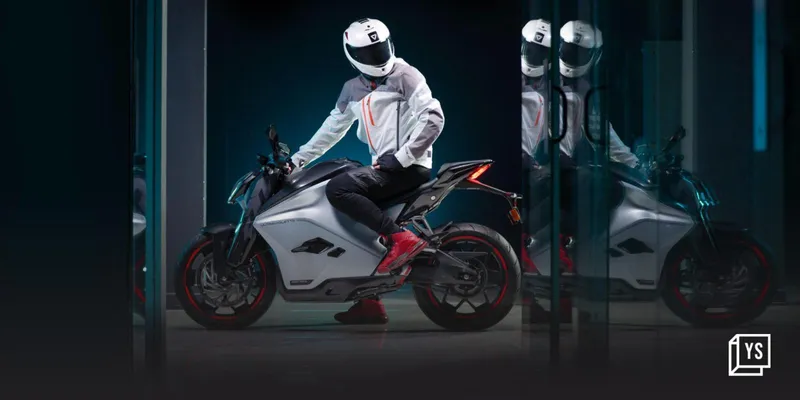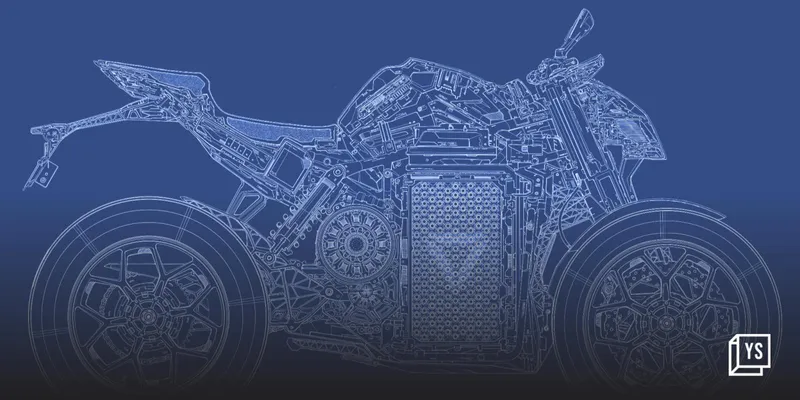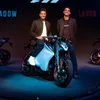Electric superbike maker Ultraviolette is revving up for growth
TVS Motor-backed Ultraviolette has been warming up the market for its electric superbike—F77—since 2019. It expects to start delivery of its bikes in Bengaluru in January 2023, followed by Chennai, Pune, Mumbai, and Kochi.
Bengaluru-based electric superbike maker finally launched its much-awaited F77 at an event in KTPO Centre, Bengaluru, recently. The made-in-India product was a work-in-progress for almost six years before it rolled into showrooms on November 24.
Founded by Narayan Subramaniam and Niraj Rajmohan in 2015, Ultraviolette’s aim has been to create an electric motorbike that is not just aspirational but also functional and environment-friendly.
The F77 is available in three variants: Airstrike, Shadow, and Laser. The current iterations come with a top speed of 152 kmph with an acceleration of 0 to 100 kmph in 7.8 seconds, placing the bike in direct competition with Energica EGO+/RS, Harley Davidson LiveWire, and Lightning LS-218. The F77 has three riding modes—Glide (suitable for riding on city streets), Combat (for riding on freeways and highways), and Ballistic (for long-distance travel and sports).
The battery pack has a 10.3 kWh capacity and comes with an eight-year warranty and a 307-km Indian Driving Condition range on a single charge.
The bikes are priced from Rs 3.80 lakh to Rs 5.50 lakh (ex-showroom).
According to the company, the influence of aviation and aerospace engineering can be seen in the bike's design, structural simulations, aerodynamic analysis, and battery technology.
“The core philosophy of aviation engineering revolves around the fact that every single part in an aircraft should serve a functional purpose and must be engineered for 100% accuracy and safety. This has been our guiding principle from Day 1. Over the last few years, we have spent endless hours perfecting the F77 across all aspects of design, vehicle engineering, performance, safety, and user experience,” says Niraj Rajmohan, Co-founder and CTO, Ultraviolette.
Ultraviolette conducted F77’s first test run on August 15, 2022. Pilots from the Indian Airforce tested the bike on the tarmac of Taneja Aerospace and Aviation Ltd's airfield. In the same month, the company raised Series D funding from a fund managed by EXOR Capital.
During the launch, Indian actor Dulquer Salmaan, who has been associated with Ultraviolette since 2016, said, "I've always been interested in cars and motorcycles and am glad to be one of the earliest investors in Ultraviolette, a company driven by founders committed to making the coolest, globally aspirational hi-tech electric vehicles. I am definitely committed to this brand for the long term."
Finding the sweet spot
Unlike many EV makers, the Ultraviolette team was focussed on developing bikes, instead of launching electric scooters. The team consciously chose to focus on developing bikes equivalent to the midsegment range of ICE (internal combustion engine) motorcycles (300 to 500 CC).
“Technology at the lower end of the spectrum is hard to scale. While electric scooters typically output 3-5 kilowatts (kW) of power, our motorcycles have an output close to 30 kW and can extend all the way to 50-60 kW,” says Narayan Subramaniam, Co-founder and CEO, Ultraviolette.
According to Niraj, there was no EV option that could compete with internal combustion (IC) engines and this was the problem Ultraviolette wanted to solve. “Tesla proved that EVs can outperform IC engines, both savings and performance-wise. Our approach has to be equivalent to that,” he says.
According to Allied Market Research, the global electric vehicle market, which was valued at $163.01 billion in 2020, is projected to grow to $823.75 billion by 2030, at a CAGR of 18.2% from 2021 to 2030.

Ultraviolette F77
Building a team
The Ultraviolette team onboarded experts from automotive, consumer tech, and aerospace to create the electric superbike.
Finding the right talent pool was easy, but aligning people with Ultraviolette’s vision and mission was a challenge.
“People were initially sceptical about joining us, but over time our team has become a good mix of experts from aerospace, avionics, consumer electronics, and mechanical engineering,” says Narayan.
Over 95% of the components of the F77 are produced in India; the cells and magnets come from overseas partners.

Ultraviolette F77 blueprint
Redesign and change of plans
Ultraviolette was doing final iterations when COVID-19 hit the world. The pandemic pushed the timelines for launch as the production facilities were locked down and the global semiconductor supply chain was stalled.
The company used the period to remodel and redesign the F77. All plans for the second version of F77 were implemented in the first version itself.
“Over the last five years, we have looked into varied bike segments to ensure safety and performance. We redesigned the batteries to ensure proper heat dissipation. We life-tested the batteries and subjected them to three, five, and eight-year simulations,” explains Niraj.
This presented the team with more data to accurately predict their performance and life cycle and define the exact warranty period.
EVs have recently attracted negative attention on account of reports of them catching fire.
“The negative association of EVs with safety issues is actually a good thing because it makes consumers and companies more aware. An electric company can no longer avoid taking responsibility for ensuring quality. EV manufacturers need to collectively ensure that the quality and reliability of products is better than IC engines, our main competition,” says Narayan.
Future roadmap
The Ultraviolette team has high expectations from the ever-evolving EV market in India.
“All consumer segments are going through a transition and it is already becoming hard to envision norms and make assumptions about what is next. But we know what our targets are,” says Niraj.
As many as 70,000 pre-registration interests have been received from over 190 countries. While international expansion is planned, the Indian rollout of the F77 will begin in January 2023 in Bengaluru, followed by a pan-India rollout and a company-owned servicing ecosystem through 2023.
The first Ultraviolette Experience Centre is scheduled to be opened in Bengaluru.
(The copy was updated with the names of the riding modes.)
Edited by Teja Lele









